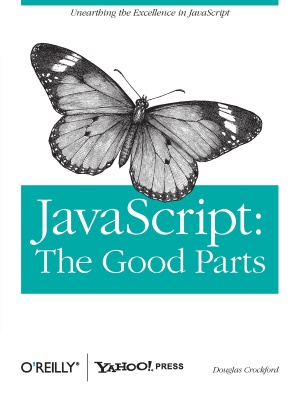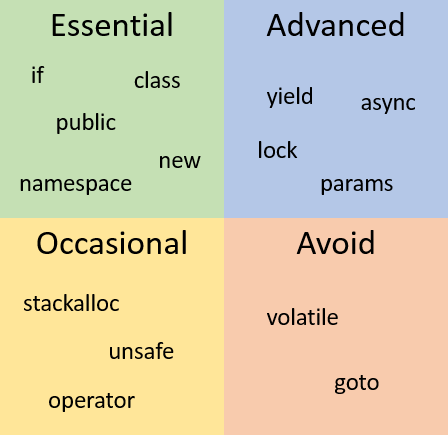Yesterday I was trying to learn F# by reading through the O’Reilly book and trying a few code samples.
I then made a flippant remark:
I wish someone would write 'F# - the good parts'
— Richard Astbury (@richorama) May 24, 2016
I got quite a few responses, with people joking that it was all good, or all bad, but I also got serious offers of help.
I’ve spent some more time thinking about this, so I thought I would jot some ideas down.
But first of all, I have nothing against F#, I’m trying to learn it because it looks like a powerful language, and it has an active and friendly community. Please don’t take anything here as a criticism against F#.
JavaScript

Whether you love or hate JavaScript, this is probably the best book you can buy on the language. It’s a bold book. Most programming books aim to cover as many language features as possible, maximising book thickness to occupy as much shelf space as possible. But this book is different. It’s relatively thin (JavaScript is a small language) and it walks you through the parts of the language you should use. It leaves the other bits for an appendix.
Why is less more?
I find learning hard. It takes time (I don’t have much free time) and it takes effort (I don’t have much of that either). When learning a language I don’t want to know all of it, I want to know the pieces that I need. But it’s difficult to know what you need until you know the language. Which is why Crockford’s book is so great, he’s made those decisions (mistakes) for you, and he made the right decisions.
What about F#?
My frustrations yesterday went something like this:
BOOK>There is this concept called modules, here is some information about it.ME>attempt to retain informationBOOK>Oh, modules aren’t much good for large projects and .NET interop, use namespaces instead.ME>purge module knowledgeBOOK>You can have explicit constructors on objects.ME>attempt to retain informationBOOK>Oh, don’t use those things, use implicit constructors.ME>purge explicit constructor knowledgeBOOK>You can use lists to hold a number of values.ME>attempt to retain informationBOOK>But a sequence is better, because it’s lazy!ME>purge list knowledgeBOOK>Here is how to do a pattern match, use thematchkeyword.ME>attempt to retain informationBOOK>Or you can just use thisfunctionkeyword instead, it’s more terse.ME>send frustrated tweet
This dialogue is not exhaustive.
Classifying language features
I’ve come up with a way of classifying language features, something like this:
Essential - features that you must have to write a program.
Advanced - features that you don’t need, but will make your program more efficient/elegant/maintainable.
Occasional - features that are seldom required, and it’s OK to google when you need to use.
Avoid - features which you shouldn’t use, just forget they exist.
To help illustrate what I mean, I’ll classify some C# keywords:

Yes C# has goto ;¬)
People might disagree on some of the finer points about where keywords might sit,
but I don’t think many people would argue that goto is essential, and you should avoid namespace.
As a language evolves you can expect these classifications to change. When new features arrive, they might displace older features, and relegate them to ‘Occasional’ or ‘Avoid’. We do this to maintain backwards compatibility (although languages like Python and Ruby have sacrificed this).
In C# and JavaScript, I have (unconsciously) built this mental model of the language. This has taken a long time, and it’s probably an ongoing process. But now I know there are parts of these languages which I know aren’t useful, or can cause problems, so I don’t use them. I can unlearn them.
With F# the canvas is blank. I don’t know where to put things. Is it really important for me to know how to use discriminated unions for tree structures? Do people use records, or do they just build classes? Should I always use a sequence in preference to a list?
In conclusion
This is why I would like a book that can take someone’s experience with the language and records it in a way that makes it easier for me to learn. Just like Crockford did. Perhaps it starts with the ‘Essentials’, and finishes with the ‘Advanced’. I’ll just google the ‘Occasional’ stuff, and please leave out the ‘Avoid’ stuff, thanks!